About this Blog: Murshidabad Heritage Festival, organised by the Murshidabad Heritage Development Society (MHDS) is a 2-3 days festival to promote the heritage and culture of Murshidabad. Read this blog to know more about the festival and our experience at Murshidabad Heritage Festival 2022.
Murshidabad is one of the major historical destinations in West Bengal. Though the place is mostly famous for the Hazarduari Palace, Murshidabad is replete with history and heritage and definitely speaks volumes about the past of Bengal. Murshidabad also has a unique cultural identity. The historical and cultural heritage of Murshidabad has been brought out beautifully by the annual Murshidabad Heritage Festival.

This year in 2022, we attended the Murshidabad Heritage Festival and got an experience of the heritage and history of Murshidabad and the surrounding areas.
A Brief History of Murshidabad
Since we are talking about the heritage of this small town beside the Bhagirathi River, it is always good to know about how the place came to be.
Murshidabad was originally a nondescript village named Maksudabad. It came to limelight only when Nawab Murshid Quli Khan made it the capital of Bengal Province. The Bengal Province, at that time consisted of present-day Bangladesh and the Indian states of West Bengal, Bihar, Jharkhand and Odisha.

Murshid Quli Khan was previously known as Mirza Hadi and when the Mughal Emperor Aurangzeb was looking for a Diwan in Bengal at Dacca,Hadi was his choice. Mirza Hadi was then also known as Kartalab Khan. Later, he relocated his office from Dacca to Maksudabad on the banks of River Bhagirathi. Maksudabad was located in the central part of Bengal and Khan thought that it would be better to communicate from there.
Aurangzeb was happy with the revenue that Kartalab Khan gave him and awarded him the title of Murshid Quli among others. Consequently, he changed the name of Maksudabad to Murshidabad in 1704. Later Murshid Quli Khan declared himself the Nawab of Bengal and thus became the first independent Nawab of the province.
While Murshid Quli Khan became the first Nawab, Manik Chand became his personal banker. Mughal Emperor Farrukhsiyar, after ascending the throne of Delhi in 1712, honoured Manik Chand with the title of Nagar Seth (Banker of the city).

Murshidabad and European Traders
Murshidabad was one of the most prosperous cities of Bengal Province. The place was rich in natural resources and with the river flowing by, trade and commerce flowed and the town was quite prosperous. Most of the European traders like the Dutch, Armenians and British had settled around the Murshidabad and Cossimbazar area for trade and business. Infact, the Dutch had arrived at the area even before Maksudabad became Murshidabad.
There is a Dutch cemetery, British Cemetery and an Armenian Church in the Cossimbazar area that shows how the Europeans had settled here.
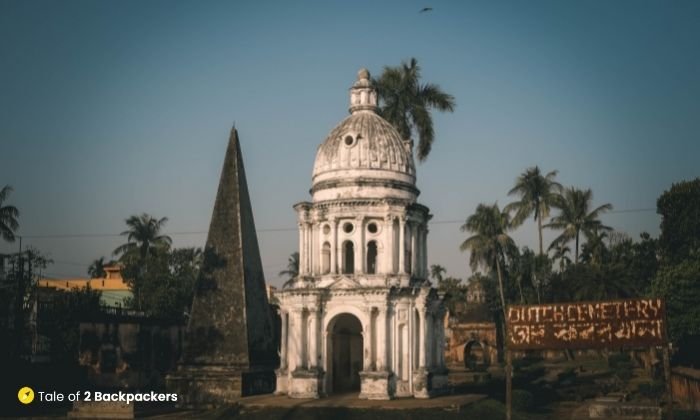
Murshidabad and the Sheherwalis
The Sheherwali communities are the Jain families who had migrated from the dry lands of Rajasthan to the greener pastures in Bengal almost 300 years ago. As traders, they moved from town to town and thus came to be known as the Sheherwalis (from the town). The Sheherwalis were the investors and consequently emerged as one of the wealthiest communities in Bengal. They became bankers to the Nawabs as well as to the European traders. The Jain traders mostly settled in Azimganj and Jiaganj, towns located around Murshidabad. They built their mansions and temples around these two towns.

The Jain community started living in Bengal and adapted to the ways of life here. A unique amalgamation of culture took place. The traders from Rajasthan included the culture of Bengal in their dresses, cuisines and general way of life. A little bit of Awadhi and European influences also crept in. The maximum influence was seen in the cuisine – the Sheherwali cuisine, a purely vegetarian cuisine developed as one of the best mixes of the east and the west.
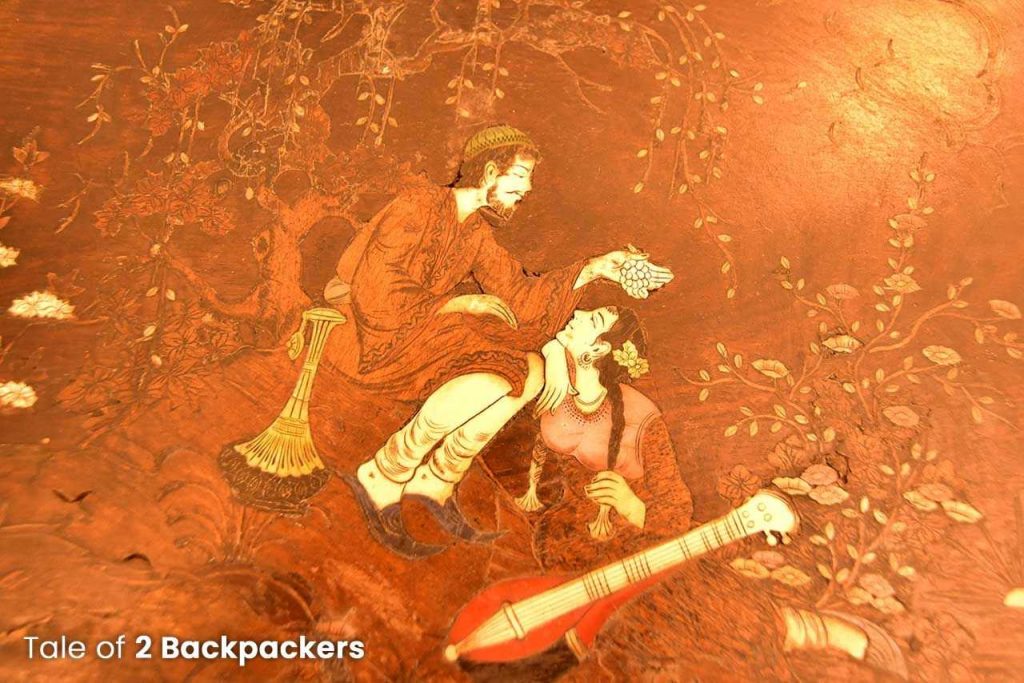
Murshidabad Heritage Festival and MHDS
Murshidabad was definitely one of the richest territories in the nation during the eighteenth century and was believed to be as flourishing as London. Along with Azimganj and Jiaganj, Murshidabad contributed a significant portion to the World GDP. And this continued even after Siraj-ud-daula lost in the Battle of Plassey to the East India Company.
However, with time, the glory and riches both declined. The heritage of the town was in shambles. People knew Murshidabad as the place of Hazarduari and the last independent state of India. Not many knew about the rich history of the place that has been influenced by people of various communities.

The Sheherwali Community of Murshidabad came up with the dream of restoring the history and heritage of the area along with development of heritage and spiritual tourism. And thus, the Murshidabad Heritage Development Society (MHDS) was born.
MHDS was founded in 2010 with the objective of mainly “preservation & Restoration of Indian heritage by focusing on Azimganj and Jiaganj in particular, and Murshidabad in general”.
And along that line, MHDS also vied for development of the infrastructure of the area and encouraged the locals to preserve and protect their legacy.
Murshidabad Heritage Festival is organised every year by MHDS in order to promote tourism and heritage in the Murshidabad region. This annual cultural Festival is held for 2-3 days and showcases the art and culture of the region through various cultural programmes, heritage walks, culinary delights and other interesting events.
This year in 2022, Murshidabad Heritage Festival was held for 3 days from March 11 to March 13.
Murshidabad Heritage Festival 2022
Murshidabad Heritage Festival 2022 was held by Murshidabad Heritage Development Society in collaboration with the Government of West Bengal Department of Tourism, Department of Information & Cultural Affairs and Department of Micro, Small & Medium Enterprises and Textiles. It was a 3-days programme with a visit to the heritage monuments of Murshidabad, enjoying Awadhi and Sheherwali cuisine, heritage walks and cultural programmes.
While we had visited Murshidabad before, this time it was special. Festivals always showcase the best of a place. And we wanted to see Murshidabad and know about its heritage more through the eyes of the people of the land.

Day 1
We started on Friday morning early from Kolkata and drove towards Murshidabad. It was a long journey of nearly 6 hours. We had decided to reach early and so did not want to stop much on the way. While enjoying the views from our car, we finally reached Berhampur at around 1:00 PM. Our stay was at Cossimbazar Palace of the Roys, another elegant heritage property located in the Cossimbazar area. Even with Google Maps on our mobiles, we asked for directions from a couple of locals and finally reached the Rajbari. Well, there is nothing like asking for directions while travelling to a new place!

Cossimbazar Palace of Roys is a beautiful property. White and elegant, it stands in front of a well maintained lawn. And we felt as if we had reached some bygone era. The Manager was there to welcome us and after having our welcome drink, we were given our rooms.

Our room was quite beautiful with a sitting area and a well decorated room. But before we could really swoon over Cossimbazar Rajbari, we had to get ready for lunch that was to be held at Barikothi.
We went to Jiaganj Ferry Ghat and crossed the river by Ferry to Barikothi. We had previously visited Bari Kothi and you can get the details of this extremely gorgeous property in our article on that.
Barikothi serves everything vegetarian. The lunch on the first day was Awadhi cuisine consisting of paneer Tikka, mochar chop, eggplant preparation, alu dum, rice, paratha and many more. The meal ended with gajar ka halwa and Shahi Tukda.

Exploring Murshidabad
The food was quite tasty and after the sumptuous lunch we once again crossed the river on a ferry and went off to explore a few heritage monuments in the northern parts of Murshidabad.
We first visited the House of Jagat Seth, a noted banker during the time of the Nawabs. His house has now been converted into a museum. There is also a Jain temple in the premises dedicated to Parasnath, the 23rd Jain Tirthankara.
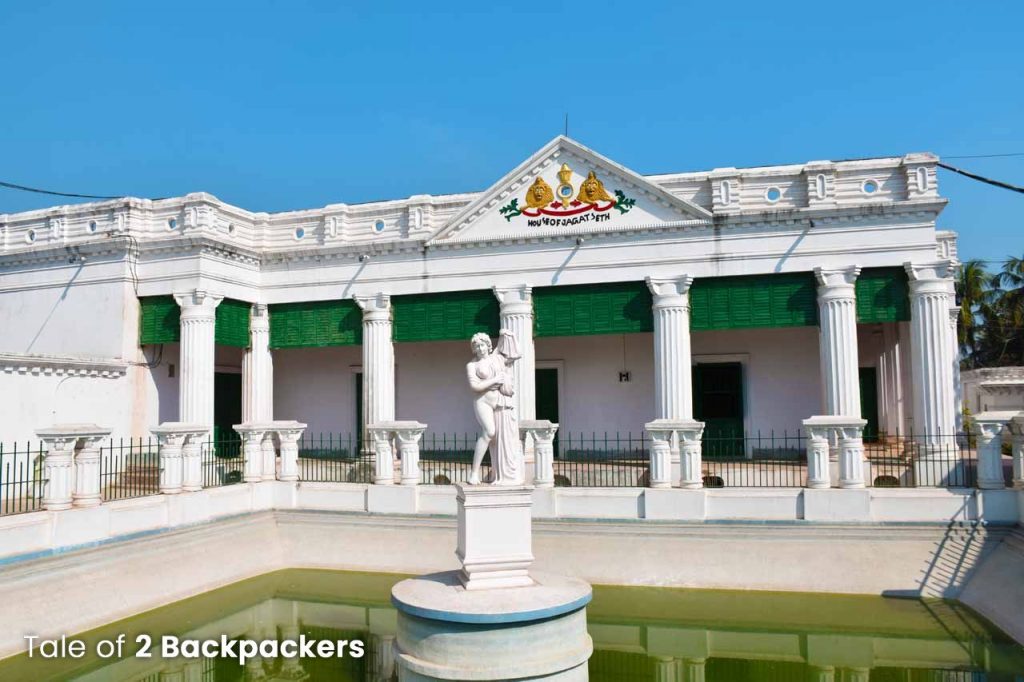
The next stop was Nashipur Rajbari that has also been converted into a museum.

Next, we visited the hauntingly beautiful Katra mosque, one of the oldest standing monuments in Murshidabad. The Katra Mosque was built by Murshid Quli Khan in 1723 and also houses his tomb.
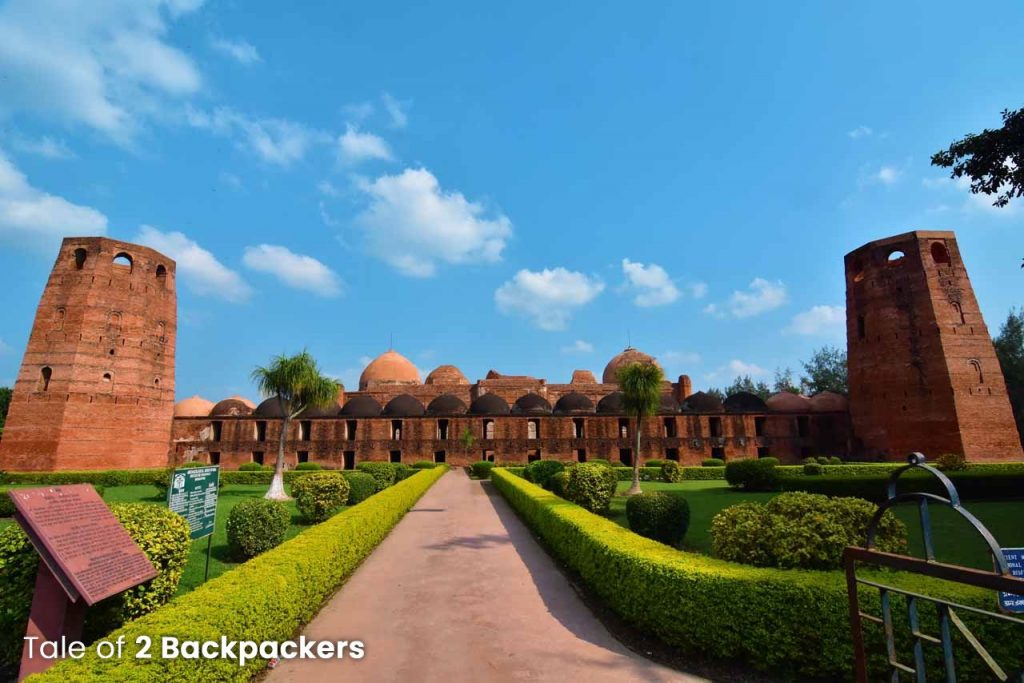
It was already dusk by the time we left Katra Mosque and we headed towards Motijheel Park. Motijheel is a beautiful ox-bow shaped lake deriving its name from the extensive pearl cultivation during the Nawabi period. Infact, Motijheel literally translates into “the lake of pearl”. Motijheel was built by Nawazish Muhammad Khan, the son-in-law of Alivardi Khan. After the Battle of Plassey, Motijheel served as the residence of Robert Clive in 1765 when he came to negotiate the terms of transfer of Dewani to the East India Company. Other British officials too stayed at Motijheel at various periods giving it the name of “Company Bagh”.

There is an ancient mosque right on the left as you enter Motijheel. This is the only trace of the past that remains here apart from the stories.
On the other side of the lake is the well-maintained Motijheel Park that is a sight to the sore eyes. It has a well manicured garden with boating facilities, an amphitheatre and other facilities.
Crafts Exhibition & Cultural Night at Motijheel
Motijheel Park hosted the handicrafts exhibition of Murshidabad Heritage Festival. Motijheel Crafts Bazar was the place where the local artisans displayed their art and crafts. We got a glimpse of the Murshidabad Silk Saree, local pottery, shola art, dokra and other handicrafts from and around Murshidabad.

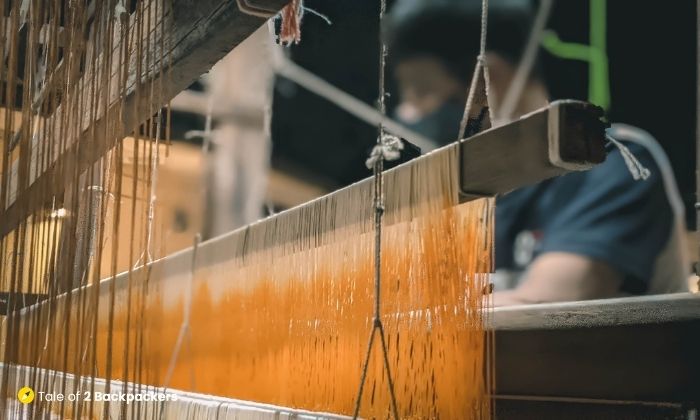
The night ended with a cultural programme of music and dance. There was soulful rendition of folk songs and Baul songs and an eclectic Raibense dance performance.


By the time we reached our stay, we were tired, but were happy.
Day 2
We started our day early and explored the area around Cossimbazar. After breakfast, we visited the exquisitely beautiful terracotta temples of Baranagar.
Baranagar is a small settlement beside the Bhagirathi River famous for the terracotta temples that were built under the patronage of Rani Bhabani. While most of the temples could not stand the ravages of time, a few temples still stand proudly depicting the simple, yet elegant architecture of the Bengal Temples.

The temples standing today are the Ek Bangla Panchanan Shiva Temple, the Char Bangla temple, the Bhabanishwar Temple, the Jor Bangla Gangeshwar Temple and the Raj Rajeswari Temple.
The Char Bangla Temple and the Jor Bangla Gangeshwar Temple have stunning terracotta works.
After Baranagar, we came to Azimganj. It is here that the Heritage walk took place. Azimganj is one of the towns that are steeped in history. We visited the Jain Temples and a couple of heritage houses.
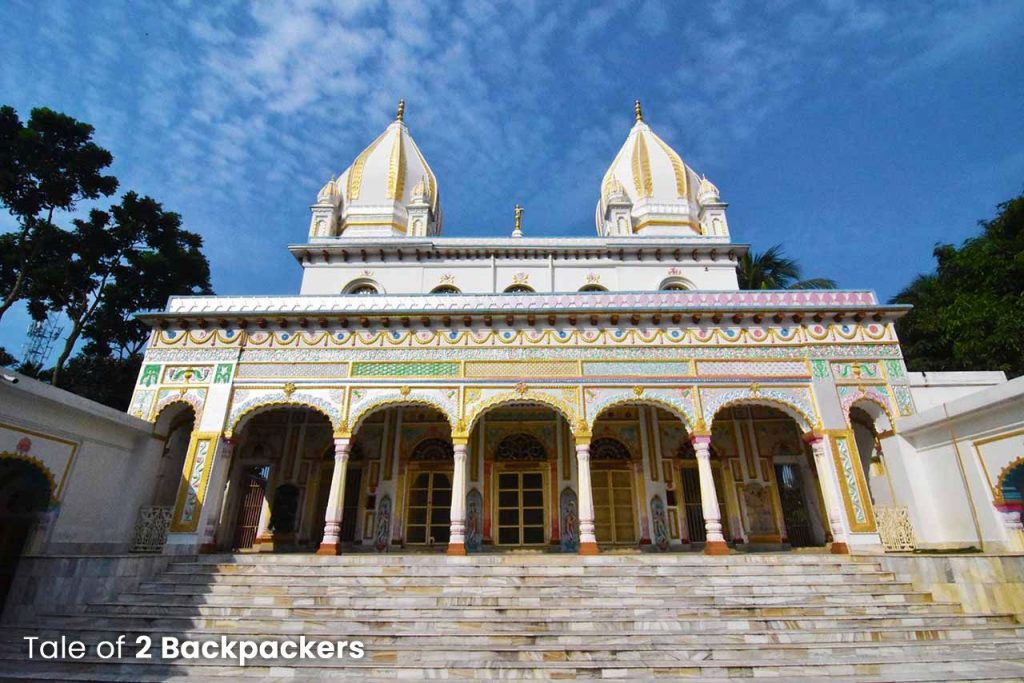
We visited the Naulakha House and it was interesting to know about the history of the place and the people. This house is also currently under restoration to develop it into a heritage hotel.
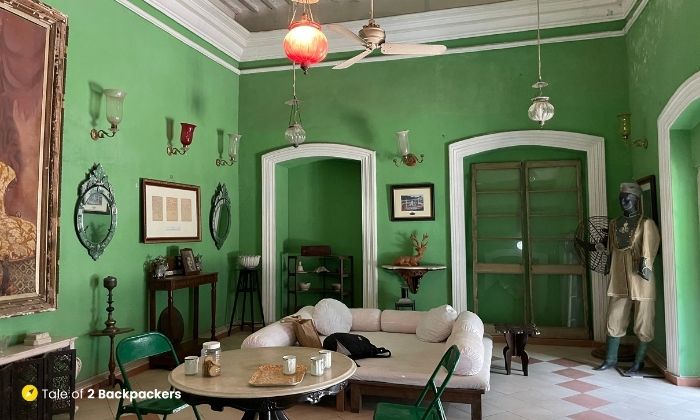
There was supposed to be a boat race that afternoon, but due to some reason it was cancelled. We were a tad bit disappointed about that. However, someone quietly pointed out that we will be back in Murshidabad again to see the boat race. Not a bad idea, though!
Lunch was served at Barikothi and it was the authentic Sheherwali cuisine. One thing that the Sheherwalis adapted from the Bengalis was the love for sweets. Sheherwali cuisine has a generous amount of sweet dishes and I definitely enjoyed satisfying my sweet tooth.
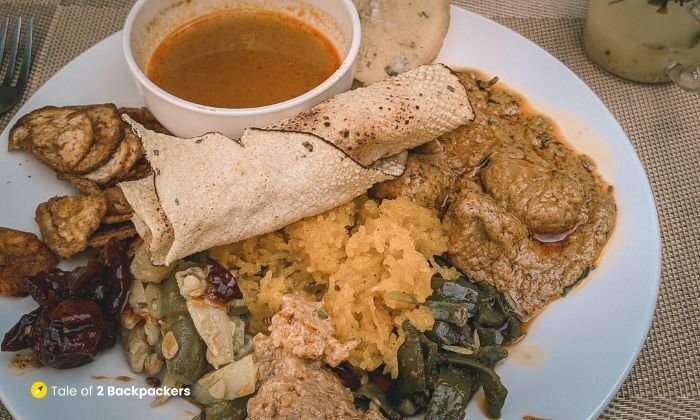
A Visit to Hazarduari
Late afternoon, we once again crossed the river and visited the famous Hazarduari Palace, undoubtedly the most iconic attraction of Murshidabad. This grand yellow structure is located just beside the Bhagirathi River. Hazarduari Palace was built by Humayun Jah during the period 1829-1837 at the site of the old fort known as Nizamat Qila (fort). Architect Duncan Mc Leod was the mastermind behind this grand building.
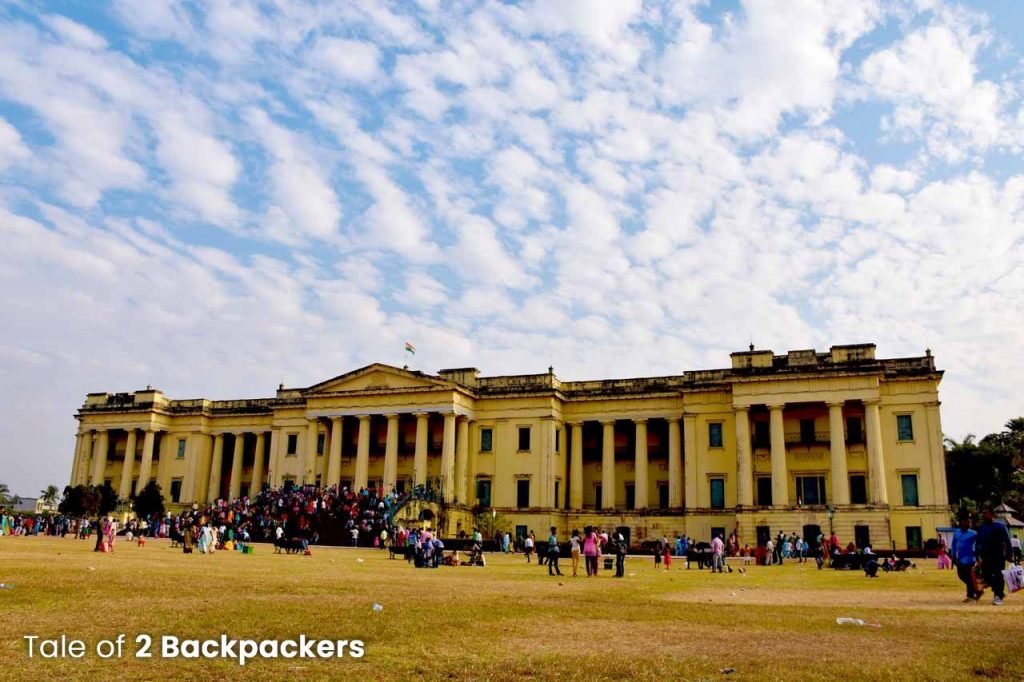
Hazarduari literally translates into “1000 doors”. However, the palace has only 990 doors and the rest 10 are fake.
Hazarduari is one of the best examples of Indo-Italian architecture. It has huge pillars, beautiful statues, sprawling staircases and a huge lawn in front. The Palace has now been converted into a museum having 20 galleries and housing some interesting relics.
Right opposite the Hazarduari Palace stands the Nizamat Imambara. The white structure stands start in contrast to the yellow coloured Hazarduari Palace. There is a clock tower and Madina Mosque inside the complex.


From Hazarduari Palace, we next visited Fox’s Kutir, an ancient building that has now been converted into a Police Quarter.

The climax of the day, however, was the visit to Kathgola Gardens. The Kathgola Palace was decorated in colourful lights and it looked like a vision. A cultural programme was arranged for the evening.
Cultural Programme at Kathgola Gardens

It would be correct to say that we were simply mesmerised watching the performances. It started with a fusion music and song performance that had all the spectators humming to their songs.

The next was a fusion dance performance by Sudarshan Chakravorty and his team. Their dance performance was simply elegant and left us wanting for more.




The next dance was a Bharatanatyam performance by Dr. Arkadev Bhattacharya and his team followed by a Kathak Performance by Sayanee Chavda and team. What had us completely awed was the fusion of Bharatnatyam and Kathak performed by both the teams.


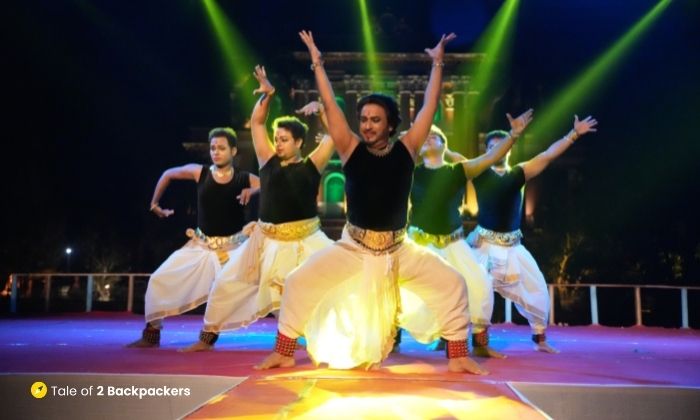
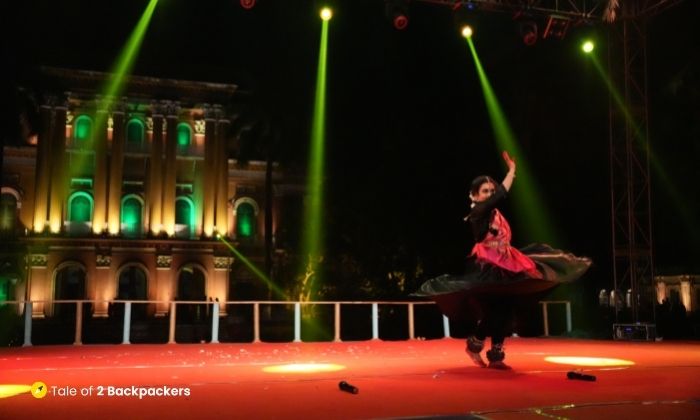



It was one such performance where the photographer in me lost to the spectator in me. I had to keep my camera down and simply look at the artists performing on stage.
The dances were followed by a fashion show by the students of G D Birla School. The last performance was another Raibense Dance by the team Sarabhuj. They were also outstanding!
We had our dinner at Kathgola Gardens and then returned back to Cossimbazar Rajbari for the night.
Day 3
It was the last day of our tour. After breakfast we visited the Tantipara or the weavers’ locality. This is the place where we saw how the Murshidabad Silk Sarees were made. While the others were busy marvelling at the sarees and shopping, we were busy talking to the local weavers.

After the Tantipara visit, we were back at Cossimbazar Rajbari for lunch. However, before lunch, we had the opportunity to explore Cossimbazar Rajbari. We went to the Nach Ghar, the sprawling courtyard, the Radhamadhab Temple and the Durga Mandir and the Chandi Mandap where Durga Puja takes place every year. Behind the palatial building, is the pond which was almost dry at that time. It was quite a surreal experience to connect stories with places, as various anecdotes of the Rajbari were narrated by the host.


Today, the lunch was authentic Bengali cuisine.
After lunch, it was time for us to leave Murshidabad for Kolkata. Leaving a place after spending a great time is always difficult. Murshidabad definitely holds a fond place in our hearts. And Murshidabad Heritage Festival opened us to history, heritage, art and culture, handlooms and handicrafts of the place. All these are something that we absolutely love.
Murshidabad Heritage Festival is thus a complete parcel of history, art and culture, cuisine and tourism. While you can always visit Murshidabad, we would definitely recommend you to visit during this time.

Details of Murshidabad Heritage Festival
Murshidabad Heritage Festival is conducted by Murshidabad Heritage Development Society. The entire trip is coordinated by them.
There are 2 options to attend the festival. Either, you can book your stay, food and entry to the events, or you can book only for the meals and the events. There are 3 options to stay – Barikothi, Cossimbazar Rajbari and Hotel at Berhampore.
As of 2022, the stay at Bari Kothi e cost INR 21500 per day, stay at Cossimbazar Rajbari cost INR 18000 and stay at Berhampore cost INR 16000. The cost is for a single person. This package cost includes stay for 2 nights, all meals, heritage walk, visit to the heritage monuments and entry to the events (for all the 3 days).
The cost for meals and entry to the events only was INR 6600 per person (meals and entry to events for all the 3 days).
You can visit their website for more details.
YOU CAN KNOW MORE ABOUT A TRAVELLING TO MURSHIDABAD FROM OUR ARTICLE ON MURSHIDABAD TRIP.
Would you like to visit Murshidabad? Let us know in the comments below. If you like the post, please share it with your family, friends and neighbours to help spread the word about the interesting history and culture of Murshidabad.



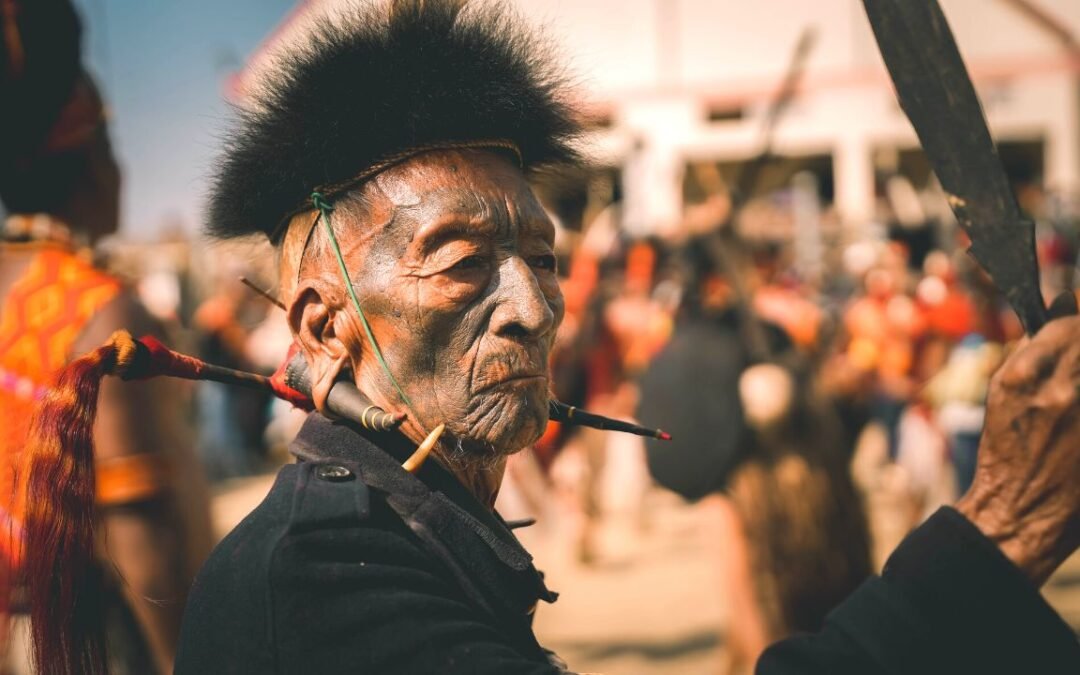


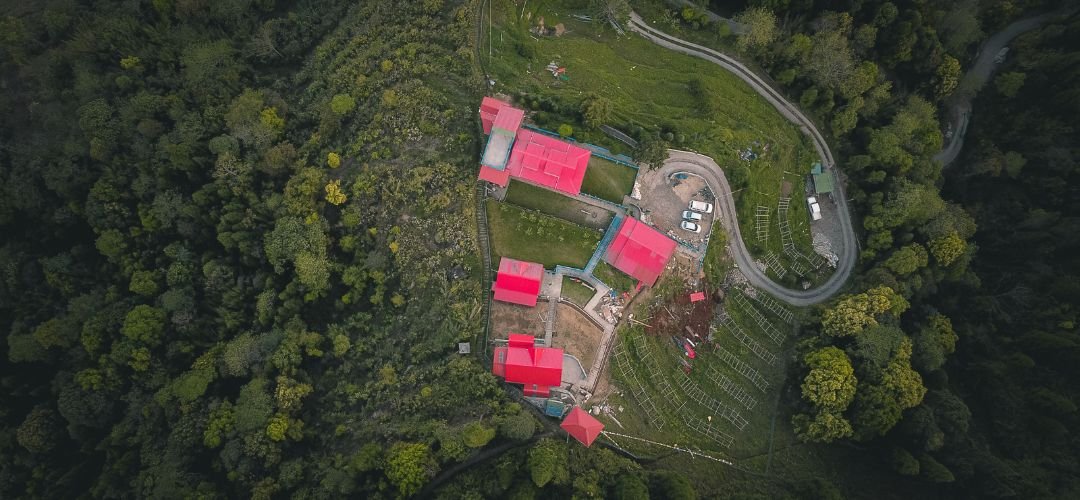


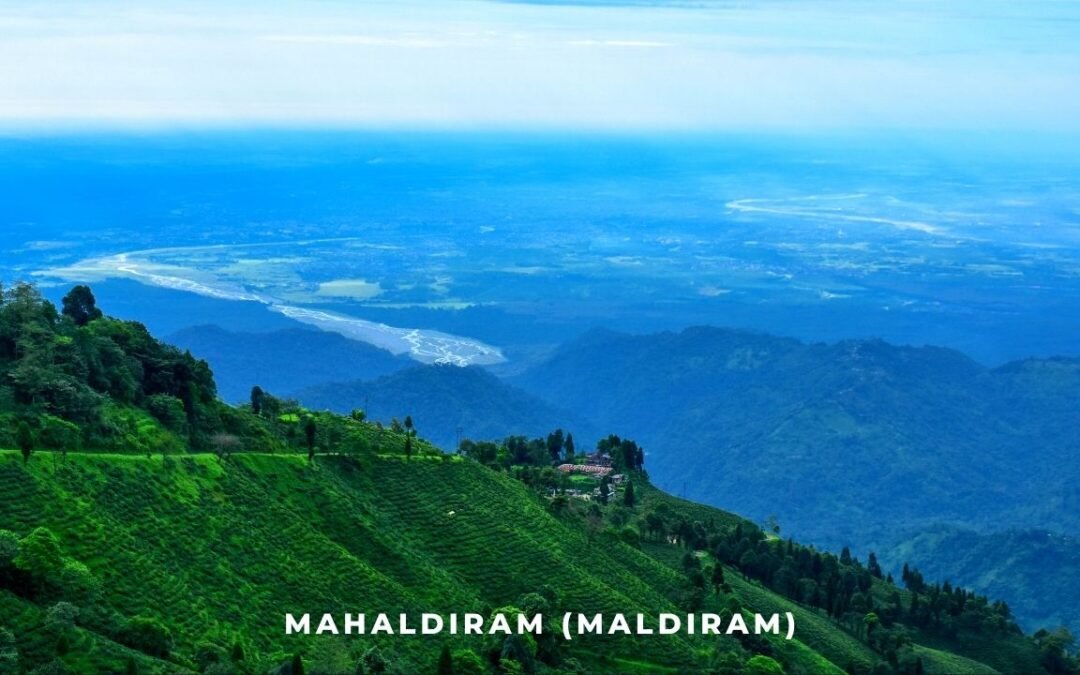
Excellent programme. Need more marketing for heritage tour of Eastern region of India .Please do publicity in advance to attract tourists from various places in India and abroad. KN college which was built in support of Kossimbazar maharaja , with an idea to replicate Imperial College of UK need to be lighted to their patronage of education.My grand father in 1919 was brought by maharaja from East Bengal awarding him Gold medal too for his performance in Matriculation .
Not only business they were tried to uplift in education of undivided Bengal.
Thank you so much for the comment. I agree that such programmes need to be publicized from before to attract tourists. I also did not know about the KN college. It is great to know such facts. I would love to discuss with you regarding Cossimbazar if given a chance. Thanks again.
“Hazarduari literally translates into “1000 doors”. However, the palace has only 990 doors and the rest 100 are fake.”
Agni Amrita: surely that must be a typo!!!! Otherwise a brilliant article, as always.
Cheers.
Thank you so much for bringing this to our notice. It was a silly mistake and now corrected. Thanks again…
Murshidabad has such a fascinating history and heritage. We have not been there, but when we were in Bikaner, we met a few Jain families, who have connections with Murshidabad. The Heritage festival seems to have been a lovely experience.
Yes, it was. Hope you visit Murshidabad sometime soon!
Annual Murshidabad Heritage Festival seems like a great combination of heritage plus culture coming together and creating vibes that cannot be missed. The cultural performance are totally a highlight
Thank you Afreen for the comment. The cultural performance was quite beautiful at the Heritage Festival.
Damn this place has such a vast history right from Aurangzeb to the European traders. Wow. Such places are never in the limelight. Thanks for sharing this with us.
Thank you so much for the comment!
As you know I am from Kolkata and I am fairly aware of the glory of Murshidabad. Yet I have never be enable to make it. Your article makes me so jealous. Love the photographs. Hope to pay a visit once this app receive heat ebbs off.
Hi Bedabrata! Please come to Kolkata and do visit Murshidabad. I am sure you will love the place.
This is such a cool festival! I have never been to India, but have been intrigued since Taiwan is close to it!
Thank you for the comment, Amy!
I had seen all those stories about Murshidabad and Bari Kothi, but wasn’t aware about the history. This was quite an intriguing read guys. The fact that Murshidabad is a beautiful roadtrip from Kolkata, will definitely add Murshidabad Heritage Festival on a lot of travellers itineraries. Specially the ones who are history buffs.
Thank you Arnav! Murshidabad is a great place for history and architecture buffs.
Murshidabad is always in my must visit travel list as the city has lots to offer. Even now I am planning to stay at the palace and want to explore more the heritage side too . Lovely post
Thank you so much Pamela. Come soon and we will explore togethre!